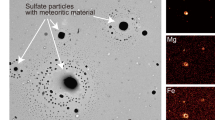Abstract
A YEAR-LONG programme involving daily collections of atmospheric dust at several widely separated, isolated sites has been undertaken with the object of identifying particles that may be of extra-terrestrial origin. The particles in question are opaque, shiny spherules with diameters less than 10 microns. They appear to be of a nature entirely different from that of the larger spheres abounding in densely populated areas. Their meteoritic nature is suggested by the fact that the rate of fall and the frequency distribution with size of these particles have been found to be the same at the various stations.
This is a preview of subscription content, access via your institution
Access options
Subscribe to this journal
Receive 51 print issues and online access
$199.00 per year
only $3.90 per issue
Buy this article
- Purchase on Springer Link
- Instant access to full article PDF
Prices may be subject to local taxes which are calculated during checkout
Similar content being viewed by others
References
Thomsen, W. J., Sky and Telescope, 12, 147 (1953).
Buddhue, J. D., “Meteoritic Dust” (University of New Mexico Press).
Crozier, W. D., New Mexico Institute of Mining and Technology (personal communication, 1956).
Kizilirmak, Abdullah, Comm. Faculté d'Ankara, 6, Séri A-Fasc. 2, 186 (1954).
Author information
Authors and Affiliations
Rights and permissions
About this article
Cite this article
HODGE, P. Opaque Spherules in Dust collected at Isolated Sites. Nature 178, 1251–1252 (1956). https://doi.org/10.1038/1781251a0
Issue Date:
DOI: https://doi.org/10.1038/1781251a0
Comments
By submitting a comment you agree to abide by our Terms and Community Guidelines. If you find something abusive or that does not comply with our terms or guidelines please flag it as inappropriate.



